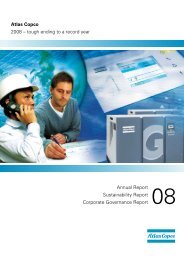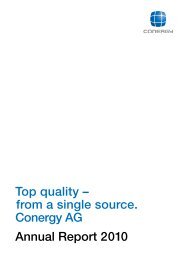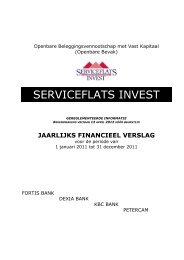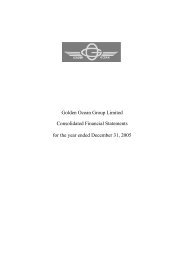BOC Report and accounts 2005 - Alle jaarverslagen
BOC Report and accounts 2005 - Alle jaarverslagen
BOC Report and accounts 2005 - Alle jaarverslagen
You also want an ePaper? Increase the reach of your titles
YUMPU automatically turns print PDFs into web optimized ePapers that Google loves.
<strong>Report</strong> on remuneration 77<br />
Individual service contracts Mr Bevan has a contract dated 5 December 2002 that can be terminated by the<br />
company on 12 months’ notice. In the event of early termination, the contract provides for the payment of<br />
compensation based on the value of salary, car benefit <strong>and</strong> bonus entitlement (calculated on the basis of the<br />
average of actual payments over the preceding two years) for the unexpired portion of the notice period.<br />
Mr Bevan would also be entitled to his deferred pension, with the unexpired portion of the notice period being<br />
added to his pensionable service in the calculation of his pension entitlement.<br />
Mr Isaac has a contract dated 19 November 2002, varied by letter dated 1 June 2004, which expires upon<br />
the conclusion of the Annual General Meeting in 2007 subject to possible extension by mutual agreement.<br />
The contract can be terminated by the company on 12 months’ notice. In the event of early termination, the<br />
contract provides for the payment of compensation based on the value of salary, car benefit <strong>and</strong> bonus entitlement<br />
(calculated on the basis of the average of actual payments over the preceding two years) for the unexpired portion<br />
of the notice period. Mr Isaac would also be entitled to a contribution to his funded unapproved retirement benefit<br />
scheme amounting to the sum of 40 per cent of his pay above the ‘pension cap’ imposed by the Finance Act 1989<br />
<strong>and</strong> 58.33 per cent of his pay up to the cap for the unexpired portion of his notice period.<br />
Dr Rajagopal has a contract dated 1 May 1999, amended 22 November 2002, that can be terminated by<br />
the company on 12 months’ notice. In the event of early termination, the contract provides for the payment of<br />
compensation based on the value of salary, car benefit <strong>and</strong> bonus entitlement (calculated on the basis of the<br />
average of actual payments over the preceding two years) for the unexpired portion of the notice period.<br />
Dr Rajagopal would also be entitled to have his deferred pension from the UK senior executive pension scheme<br />
(a) calculated with the inclusion of the unexpired portion of his notice period in the calculation of pensionable<br />
service; <strong>and</strong> (b) paid without actuarial reduction from age 55.<br />
Mr Masters has a contract dated 11 March <strong>2005</strong>, effective from 1 March <strong>2005</strong>, that can be terminated by the<br />
company on 12 months’ notice. In the event of early termination, the contract provides for the monthly payment<br />
of compensation based on the value of salary, car benefit <strong>and</strong> bonus entitlement (calculated on the basis of the<br />
average of actual payments over the preceding two years) for the unexpired portion of the notice period. Should<br />
Mr Masters obtain alternative employment during the period for payment of the monthly payments then each<br />
monthly payment still outst<strong>and</strong>ing would be reduced by the basic monthly remuneration received from his<br />
alternative employment.<br />
Alternatively, the contract also provides for the company to pay a lump sum termination payment in lieu of<br />
the unexpired portion of the notice period instead of the monthly termination payments. Such a payment would<br />
be equal to the base salary pro-rated to the unexpired portion of the notice period.The unexpired portion of<br />
Mr Master’s notice period would be added to his pensionable service in the calculation of his pension entitlement<br />
from the US Senior Executive Retirement Plan. His US Cash Balance Retirement Plan <strong>and</strong> Savings Investment Plan<br />
benefits would be credited with an amount equivalent to the amount the company would have contributed during<br />
the unexpired portion of his notice period. His active participation in the Cash Balance Retirement Plan <strong>and</strong> Savings<br />
Investment Plan would cease on termination.<br />
Mr Ferguson has a contract dated 5 May <strong>2005</strong> that can be terminated by the company on 12 months’ notice.<br />
In the event of early termination, the contract provides for the monthly payment of compensation based on the<br />
value of salary, car benefit <strong>and</strong> bonus entitlement (calculated on the basis of the average of actual payments over<br />
the preceding two years) for the unexpired portion of the notice period. Should Mr Ferguson obtain alternative<br />
employment during the period for payment of the monthly payments then each monthly payment still outst<strong>and</strong>ing<br />
would be reduced by the basic monthly remuneration received from his alternative employment.<br />
Alternatively, the contract also provides for the company to pay a lump sum termination payment in lieu of<br />
the unexpired portion of the notice period instead of the monthly termination payments. Such a payment would<br />
be equal to the base salary pro-rated to the unexpired portion of the notice period. Mr Ferguson would be<br />
entitled to a contribution to his personal pension plan or a cash amount in lieu of his pay supplement for the<br />
unexpired portion of his notice period.<br />
If the contract is terminated within two years of his date of appointment, the company, with Mr Ferguson’s<br />
agreement, has the discretion to make such termination payments in one lump sum or on a monthly basis.<br />
All of the above contracts can be terminated by the individual director on six months’ notice.<br />
Mr Walsh resigned from the board on 1 March <strong>2005</strong> <strong>and</strong> left the company on 31 March <strong>2005</strong>. He received<br />
no severance payment.All of his long-term incentive plans lapsed on his resignation.<br />
Mr Médori resigned from the board <strong>and</strong> left the company on 31 May <strong>2005</strong>. He received no severance<br />
payment. He was entitled to exercise one vested share option which he was granted under the Executive Share<br />
Option Scheme 1995 within three months of leaving the company.All of his other long-term incentives lapsed on<br />
his resignation.<br />
Shareholding guidelines<br />
The remuneration committee encourages the executive management group to grow personal shareholding in the<br />
business over time. It is anticipated that each executive would build towards a shareholding of one times salary.<br />
The remuneration committee believes that the vehicle of the long-term incentive arrangements will facilitate the<br />
building of such a shareholding over a period of time.

















